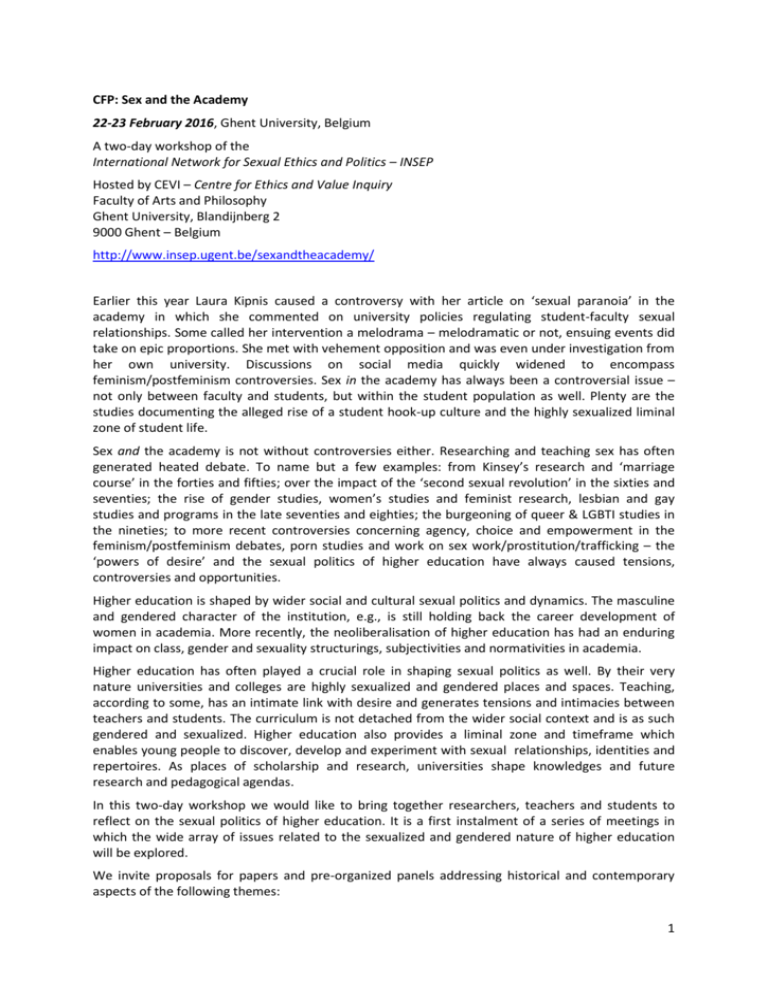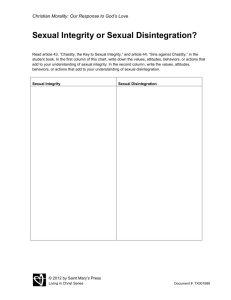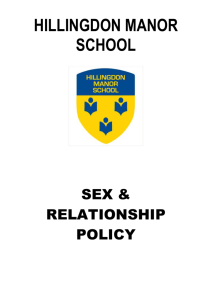
CFP: Sex and the Academy
22-23 February 2016, Ghent University, Belgium
A two-day workshop of the
International Network for Sexual Ethics and Politics – INSEP
Hosted by CEVI – Centre for Ethics and Value Inquiry
Faculty of Arts and Philosophy
Ghent University, Blandijnberg 2
9000 Ghent – Belgium
http://www.insep.ugent.be/sexandtheacademy/
Earlier this year Laura Kipnis caused a controversy with her article on ‘sexual paranoia’ in the
academy in which she commented on university policies regulating student-faculty sexual
relationships. Some called her intervention a melodrama – melodramatic or not, ensuing events did
take on epic proportions. She met with vehement opposition and was even under investigation from
her own university. Discussions on social media quickly widened to encompass
feminism/postfeminism controversies. Sex in the academy has always been a controversial issue –
not only between faculty and students, but within the student population as well. Plenty are the
studies documenting the alleged rise of a student hook-up culture and the highly sexualized liminal
zone of student life.
Sex and the academy is not without controversies either. Researching and teaching sex has often
generated heated debate. To name but a few examples: from Kinsey’s research and ‘marriage
course’ in the forties and fifties; over the impact of the ‘second sexual revolution’ in the sixties and
seventies; the rise of gender studies, women’s studies and feminist research, lesbian and gay
studies and programs in the late seventies and eighties; the burgeoning of queer & LGBTI studies in
the nineties; to more recent controversies concerning agency, choice and empowerment in the
feminism/postfeminism debates, porn studies and work on sex work/prostitution/trafficking – the
‘powers of desire’ and the sexual politics of higher education have always caused tensions,
controversies and opportunities.
Higher education is shaped by wider social and cultural sexual politics and dynamics. The masculine
and gendered character of the institution, e.g., is still holding back the career development of
women in academia. More recently, the neoliberalisation of higher education has had an enduring
impact on class, gender and sexuality structurings, subjectivities and normativities in academia.
Higher education has often played a crucial role in shaping sexual politics as well. By their very
nature universities and colleges are highly sexualized and gendered places and spaces. Teaching,
according to some, has an intimate link with desire and generates tensions and intimacies between
teachers and students. The curriculum is not detached from the wider social context and is as such
gendered and sexualized. Higher education also provides a liminal zone and timeframe which
enables young people to discover, develop and experiment with sexual relationships, identities and
repertoires. As places of scholarship and research, universities shape knowledges and future
research and pedagogical agendas.
In this two-day workshop we would like to bring together researchers, teachers and students to
reflect on the sexual politics of higher education. It is a first instalment of a series of meetings in
which the wide array of issues related to the sexualized and gendered nature of higher education
will be explored.
We invite proposals for papers and pre-organized panels addressing historical and contemporary
aspects of the following themes:
1
HE as Gendered and Sexualized Institutions
Political/Sexual/Gender correctness on campus, in teaching and research
Sexual harassment and assault - rape & date/acquaintance-rape
Sexual correctness, harassment and assault regulations and policies
Student reproductive and sexual health issues and promotion, facilities & access
Campus tolerance, solidarity & sexual identity and orientation
Cultural and sexual diversities
HE institutions as loci and agents of change – sexual revolutions & backlashes
Women, careers and the academy - gender mainstreaming policies & challenges
HE and masculinity
The sexual politics of the neoliberal university
Researching & Teaching Sexuality
Researching and teaching sexuality studies & sexuality-related topics
Gendered curricula & research agendas
HE as a critical/disciplinary space and regime
Feminist, queer and critical pedagogies
Sexual identities, orientations and academic careers
Libraries, erotica & pornography
Researching student sexualities
Research ethics and sexuality research
Women's, feminist and (post)gender studies and their relation with sexuality studies
Feminism(s)/Postfeminism(s) and the agency & empowerment debates in HE
The place of queer studies in HE
Sexology and its place in HE
Freedom of speech, academic freedom and censorship
The erotics of teaching and education
Student Sexual Relations and Explorations in HE
Liminality - student life as a liminal zone of sexual opportunities, discovery & experimentation
Student-Faculty Sexual Relations - Authority & Power (im)balances; consent, choice,
responsibilities, vulnerabilities & harm
The sexual imperative and peer conformity pressures
Hook-up Culture, Friends with benefits & Casual Sex
Technologies of dating & sexualised social media
Hetero & homonormativities - Inclusions and exclusions
Student gender identities, ambiguities and sexual orientations
Sexual reputations and double standards
(International) Student mobility: opportunities and challenges
Student unions as sexualised and/or sexuality/identity-based organisations
Student events - parties, upper dare’s, …
Student sex work
Sexual activism & feminist mobilisation on and off campus
Submission & Timeline
Abstracts for presentations (300 words) or for panels of up to three speakers (please submit a 500600 overview and set of abstracts) should reach us by 15 November 2015 at the latest, with
notification of acceptance 22 November 2015. To facilitate funding applications you can submit an
abstract in advance of the regular deadline – our turnaround time for refereeing in this case is 10
days and we can provide documentation where it is required to facilitate funding.
Please send abstracts to: insep.network@gmail.com
2
The fee for the two-day workshop is 100 Euro. A concessionary rate of 50 Euro is available to
students and postgraduates.
INSEP publishes a journal and a book series with Barbara Budrich Publishers. We would anticipate
commissioning publications from the conference and, dependent on quality and coherence, may
publish a collection based on themes emerging from the conference. INSEP also welcomes
submissions to the journal and proposals to the Book Series.
For more info on INSEP & the Sex and the Academy initiative please visit:
Sex and the Academy: http://www.insep.ugent.be/sexandtheacademy/
INSEP – http://www.insep.ugent.be/
Journal INSEP – http://budrich-journals.de/index.php/insep
Tom Claes
Associate Professor of Ethics
Ghent University, Belgium
Tom.Claes@UGent.be
Paul Reynolds
Reader in Sociology and Social Philosophy
Edge Hill University, UK
reynoldp@edgehill.ac.uk
3









